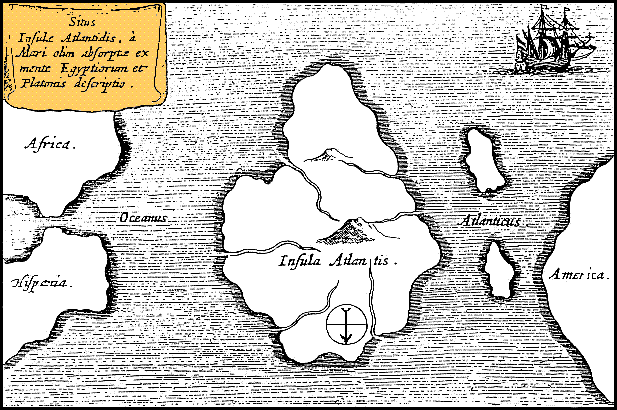Plato from The School of Athens by Raphael, 1509
| Part of a series on |
| Plato |
|---|

Plato from The School of Athens by Raphael, 1509
|
| Allegories and metaphors |
|
| Related articles |
Atlantis (Ancient Greek: Ἀτλαντὶς νῆσος, "island of Atlas") is a fictional island first mentioned in Plato's dialogues Timaeus and Critias, written in c. 360 BC. According to Plato, Atlantis was a naval power situated "in front of the Pillars of Hercules" that had conquered many parts of Western Europe and Africa 9,000 years before the time of the Athenian lawmaker Solon (c. 638 BC – 558 BC), i.e. in the10th millennium BC. After a failed attempt to invade Athens, Atlantis sank into the ocean "in a single day and night of misfortune."
"written 452 BC, Plato_Timaeus. Socrates
Athanasius Kircher's Atlantis - We know it by the words of, 'The map of Atlantis'
Athanasius Kircher's map of Atlantis, in the middle of the Atlantic Ocean. From Mundus Subterraneus 1669, published in Amsterdam. The map is oriented with south at the top.
Athanasius Kircher (1602–1680)
The possible existence of Atlantis was discussed throughout classical antiquity. The Timaeusremained known in a Latin rendition by Calcidius through the Middle Ages, and the allegorical aspect of Atlantis was taken up by Humanists in utopian works of several Renaissance writers, such asBacon's New Atlantis and More's Utopia. In the United States, Donnelly's 1882 publication Atlantis: the Antediluvian World unleashed widespread interests from pseudo-scientists. As a theme, Atlantis inspires today's light fiction, from science fiction to comic books to films. Its name has become a byword for any and all supposed advanced prehistoric lost civilizations.
Other version
(follow the below link for the full original Version)
DESCRIPTION:
English: Athanasius Kircher's Map of Atlantis (c.1669). Note that north is at bottom.
Latina: Situs Insulae Atlantidis, a Mari olim absorpte ex mente Egyptiorum et Platonis descriptio.
DATE: circa



